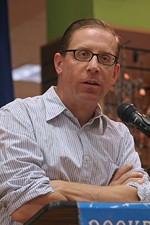One Big, Happy Family
Local TV News: There to Help You
By Chris Walters, Fri., July 5, 1996
"Have you heard the news?" he said with a grin, "The Vice-President's gone mad!"
"Where?" "Downtown." "When?" "Last night." "Hmm, say, that's too bad!"
"Well, there's nothin' we can do about it," said the neighbor, "It's just something we're gonna have to forget."
-- Bob Dylan, "Clothes Line Saga" It was clear from the outset that this job would involve a pastime I'd always neglected -- watching the local news on television. True, I'd dropped in from time to time to marvel at K-EYE's Batman set (aka the Fritz Lang Playscape), or to see if my street made the grade last fall when a wrath-of-God number rolled through and mauled trees like they were wet bar napkins. Otherwise, the schedule conflict with All Things Considered killed any stray thoughts of tuning in. ATC may have turned into earwash since National Public Radio's funding was threatened, but there's always some real narrative and fine essays.
Now, however, I know what I was missing. In the past six weeks, I have been instructed how to avoid fouling local creeks (don't pour awful crap into the gutter), how to avoid food poisoning (check expiration dates, cook meat thoroughly, wash up), how to avoid auto theft (locks, serial numbers), and how to avoid crime in general (live in a city with a low crime rate). I have received many, many basic tips on child-rearing, helping me become a more attentive dog owner. I have seen enough coverage of horrible local crimes to conclude that nobody here is achieving the standard of viciousness set by New Yorkers in the late 19th century. I have seen attractive footage of local events that looked like fun, scary footage of power-boat fetishists at play, and of the drought-ravaged landscape. I have seen coverage of important issues -- such as runamok school budgets, the cable contract renegotiation, and city council elections -- that suggested a big toe quickly sampling cold water. I have seen weather that barely changes from one day to the next receive incredibly detailed analysis. I have seen sports coverage. Like all sports coverage, it reminded me that a lot of random energy gets expended out there.
For a media critic, local TV news presents a real puzzler. The easy road -- savaging it for stories blown, facts elided, and all-over irrelevance -- is also the least attractive. So much of it is bad that it's hard to know where to begin, and getting lost along the way is a constant danger. Besides, that approach hardly seems fair. Local news on TV simply doesn't have much to do with news, unless the term is stretched to the point where it loses all meaning. Its study is really a job for a cultural anthropologist, who would probably note that the broadcasts are set up like a surrogate family, with mommy and daddy (the anchors), the friendly uncle (weather person), loony teenagers (sports guys) and assorted helpful neighbors (reporters) all doing their bit. They advance the overarching theme of a big, happily extended family (the city) that faces numerous perils and problems, most of which can be avoided or solved by deploying proper safety procedures. They reassure the rest of us that we are important, and that despite everything, the essential tasks of the family go on, everyone cheerfully working, raising children, having fun, or trying to help those who have lost their way.
"They say to themselves, `This can't do any harm.' We see evidence every day that there are people who need to be constantly reminded not to do things like pour oil down their drain," a broadcasting veteran told me. "Every news director says, `We're trying to do something for everyone.' There's a great unanimity of attitude towards these questions. You can say they're cynical, or you can say they have a highly developed sense of reality. They see it as a no-win situation to be in the position they're in and try to make it better."
A recent encounter with a local news director suggests he is right. When Carole Kneeland, the lead architect of KVUE-24's move away from automatic crime coverage, spoke at a Society of Professional Journalists meeting a few weeks ago, cynicism was nowhere in evidence. She came across as a decent and thoughtful person who works in a field where even small deviations from formula are suspect, and, with the help of her colleagues at the station, tried to change what she could anyway. She was obviously relieved that the change was well received by the viewers and members of the other media; otherwise she would be printing up new resumés. That her gamble paid off should surprise no one outside the field, for the audience couldn't possibly be as stupid and fearful as the TV news tradition would have us believe.
Kneeland's account inadvertently suggested what a bizarre world TV news workers inhabit. The decision not to run a story on three drunks who shot each other to death in a rural fleabag, for instance, took up the better part of two days of checking it out and agonizing over whether it belonged on the air. The decision not to run the piece was an admirable break with kneejerk news tradition, and it highlighted the sleaze-mongering of the other stations. Yet Kneeland was willing to admit that good intentions can defeat good journalism. Although the shootout had no news value, it was interesting as a story. A talented reporter could have made it into a witty piece on how life imitates Quentin Tarantino.
Having assaulted one TV news shibboleth and emerged unscathed, Kneeland seemed reluctant to take on any others in the near future. Someone asked her if she thought dropping sports from the broadcast or reducing it to a few local scores would hurt the show's ratings, since fans of national sports get their fix from the 24-hour cable networks. She said she thought it probably wouldn't matter, but she wasn't quite ready to risk losing her job over it. I asked her why TV news only touched on the obvious facts of political stories when some of the stories behind the facts, such as the power of campaign consultants, are potentially fascinating. She answered that informing parents about things like hazardous day care situations was perceived as more important, tacitly affirming how much the struggling-but-happy-family model holds her field in its sway.
Maybe the question was frivolous, but I don't think so. 60 Minutes has clobbered the national competition for decades, yet local news shows don't even try to emulate its format. Granted, they probably could not afford to do that kind of story more than once a week or once every two weeks. The closest they've come was the series K-EYE mounted on the Samsung Corporation, a lavish effort that included footage shot in Korea, the local reporter guy bouncing around the company compound watching mass calisthenics and the like. Unfortunately, the series gushed over its subject to the point of looking like it was produced by Samsung's publicity department -- not the kind of thing that made a name for Mike Wallace. K-EYE could have embarassed itself on one-tenth the budget.
But I don't think production budgets hold the key. Dan Streible, a friend who teaches broadcasting at the state university in Oshkosh, Wisconsin, offers a better explanation. Streible came to the job from a background in film scholarship along with some work in radio and TV, and for many of his students, the courses are only electives. So he is able to teach outside the broadcasting news lockstep and experiment with different approaches.
First he took his students through the history of radio and television news with some newspaper lore thrown in, exposing them to lots of pointed analysis and critique of the prevailing Action News format. Then he gave them assignments, making it clear they did not have the time and length constraints of a real news broadcast. To his surprise, the students turned right around and replicated standard news stories as seen on local TV all over the country. Even for students who had no broadcast careers to consider, the Action News model was so deeply ingrained that they didn't attempt much deviation. A female student who turned in better sports coverage than her male counterparts told him she wasn't really comfortable with the idea of female sports reporters.
During this year's spring semester, however, a new tack yielded gratifying results. Instead of analysis and critique, he showed his students a wide variety of nonfiction films, ranging from news pieces to independent documentaries from the last three decades. This time, the news assignments resulted in stories that were original both in topic selection and visual approach.
"I guess what I'm learning is that if you give people a diet of unconventional stuff over time, they can internalize it and actually come up with something innovative themselves," Streible told me. "But if you spend a lot of time analyzing and critiquing what they already know very well, then they're less able to practice alternatives. They may know what the shortcomings are, but they're not as prepared to invent new practices." Almost needless to say, the course structure that didn't produce bold work is closer to what most students on a broadcast career track will encounter. Until the digital information craze finishes it off, the ersatz happy families will hold their place at six-o'clock, smiling, looking anxious, reminding us to keep the kids' hands away from the garbage disposal. n
Got something to say on the subject? Send a letter to the editor.








